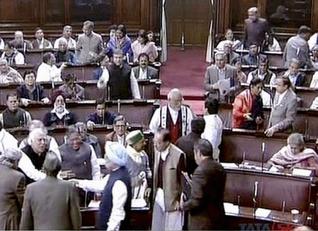
The most prominent of the group of anti-graft bills on the anvil, the Lokpal Bill establishes a lokpal at the central level and asks states to establish lokayuktas in a year's time from the date of notification of the law. The format of the lokayukta will be left to the state assemblies to decide.
The bill was passed by the Lok Sabha at the fag end of the winter session of 2011, but not by the Rajya Sabha, where it was debated but the house was adjourned before voting on it.
A select committee of the Rajya Sabha suggested changes in the bill which were incorporated and approved by the union cabinet.
Concluding the debate on the bill, law minister Kapil Sibal called it a historic moment, but stressed that corruption could not be removed by the lokpal alone.
"Law alone will not lead to elimination of corruption. Law will help deal with those who are corrupt, but it will not deal with the impetus to be corrupt. It will just be a deterrent," he said.
He also said government will also deal with the "supply side" of corruption, as pointed out by Communist Party of India-Marxist (CPM), saying a bill amending Prevention of Corruption Act, pending with Lok Sabha, provides to deal with the source of bribe.
Rajya Sabha chairman Hamid Ansari had earlier moved the motion on amendments suggested by political parties on the Lokpal Bill.
Now the bill will have to be sent to the Lok Sabha for approval of the changes. The Lower House will debate the bill in Parliament on Wednesday.
Anna Hazare, cheering the move, thanked the MPs for passing the bill adding that he will break his fast after the Lokpal Bill gets passed in the Lok Sabha tomorrow. Sabha chairman Hamid Ansari had earlier moved motion on amendments suggested by political parties on the Lokpal Bill.








Comments
Add new comment